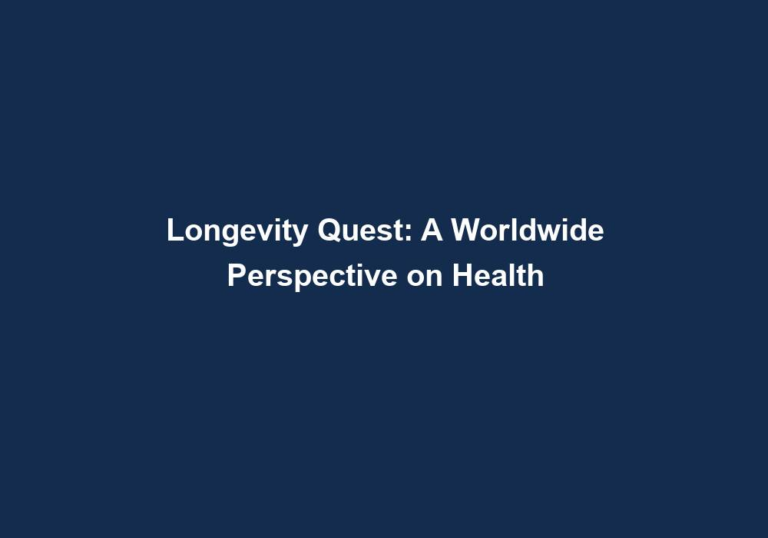Building a Healthier Legacy: Family Health History and Heart Care
Heart disease continues to be one of the leading causes of death worldwide. While various factors contribute to the development of cardiovascular issues, including lifestyle choices and environmental factors, understanding your family’s health history can provide valuable insights into your own heart health. By exploring the interplay between genetics and lifestyle, individuals can take proactive steps to prevent heart disease and build a healthier legacy for future generations.
The Significance of Family Health History
Recognizing Patterns
Examining your family’s health history allows you to identify patterns and potential risk factors for heart disease. By understanding the prevalence of heart-related conditions within your family, you can gain insight into the likelihood of developing similar conditions yourself. This knowledge can empower you to take steps to mitigate risk factors and make informed decisions regarding your health.
Understanding the patterns in your family’s health history is crucial for assessing your own risk of heart disease. By recognizing patterns of heart-related conditions, such as high blood pressure, high cholesterol levels, or early-onset heart disease, you can identify potential risk factors that may increase your chances of developing these conditions. For example, if multiple family members have experienced heart attacks at a young age, this could indicate a genetic predisposition to heart disease. By recognizing these patterns, you can take proactive measures to reduce your risk, such as adopting a heart-healthy lifestyle and seeking regular medical check-ups.
Genetic Predispositions
Genetics play a crucial role in determining your susceptibility to certain heart conditions. By recognizing genetic predispositions, you can make lifestyle adjustments and seek early interventions to reduce the impact of hereditary factors. Understanding your genetic makeup allows you to develop targeted prevention and management strategies, tailored to your specific needs.
Genetic predispositions can significantly influence your risk of developing heart disease. Certain genetic variants can increase your likelihood of developing conditions such as coronary artery disease, arrhythmias, or congenital heart defects. By understanding your genetic predispositions, you can modify your lifestyle to minimize the impact of these factors. For example, if you have a genetic predisposition to high blood pressure, you can focus on maintaining a healthy diet, exercising regularly, and managing stress levels to keep your blood pressure within a healthy range. Additionally, genetic testing can provide valuable information about specific gene mutations associated with cardiovascular conditions, enabling personalized treatment plans and early interventions.
Inherited Lifestyle Choices
Families often share more than just genes; they also tend to adopt similar lifestyle habits. These habits can significantly impact heart health. By studying your family’s health history, you can identify shared lifestyle choices such as smoking, poor diet, or sedentary behavior that may contribute to heart disease. Armed with this knowledge, you can make conscious efforts to break harmful patterns and adopt heart-healthy habits.
Inherited lifestyle choices can have a profound impact on your risk of developing heart disease. If your family has a history of unhealthy habits, such as smoking or a poor diet, you may be at a higher risk of developing heart-related conditions. By recognizing these inherited lifestyle choices, you can take proactive steps to break the cycle and adopt healthier habits. For example, if your parents or grandparents were smokers, you can choose to avoid smoking altogether and educate yourself about the dangers of tobacco. Similarly, if your family has a history of sedentary behavior, you can make a conscious effort to incorporate regular physical activity into your daily routine.
Steps to Assess and Utilize Family Health History
Gather Information
To start building a comprehensive family health history, you need to collect information from various sources. Reach out to immediate family members, including parents, siblings, and grandparents, to gather details about their medical histories. Record any major illnesses, heart conditions, or risk factors they may have experienced. Additionally, consider including information about relatives who have passed away, as some health conditions may have contributed to their deaths.
Gathering information from your family members is essential for creating a detailed family health history. When collecting this information, be sure to ask about any heart-related conditions, such as heart attacks, strokes, or high blood pressure. It is also important to inquire about lifestyle factors, such as smoking, diet, and exercise habits. This comprehensive information will provide a more accurate picture of your family’s health history and help you assess your own risk factors.
Organize the Information
Once you have gathered the necessary information, it is essential to organize it systematically. Create a document or use a family health history tool to record details such as the name, age, and relationship of each family member, along with their medical history. Include any pertinent information regarding heart-related conditions, surgeries, treatments, and lifestyle factors.
Organizing the information in a structured manner will make it easier to analyze and identify patterns or trends. Use a spreadsheet or a family health history tool to record the information, ensuring that it is easily accessible and updatable. Include details such as the age of onset for any heart conditions, the severity of the condition, and any treatments or interventions that were undertaken. This organized information will serve as a valuable resource for both you and your healthcare provider.
Identify Patterns and Risks
After organizing the information, carefully analyze the data to identify patterns and potential risks. Look for recurring heart conditions, early-onset diagnoses, or multiple family members affected by similar issues. This analysis can help you determine if there are any hereditary risk factors that may increase your chances of developing heart disease.
Identifying patterns and risks within your family’s health history is crucial for understanding your own risk factors. Look for commonalities among family members, such as shared heart conditions or risk factors. This analysis will help you determine if there are any genetic predispositions that may increase your likelihood of developing heart disease. For example, if multiple family members have experienced heart attacks at a young age, this may indicate a genetic predisposition to heart disease. By recognizing these patterns, you can take proactive measures to reduce your risk, such as adopting a heart-healthy lifestyle and seeking regular medical check-ups.
Consult with Healthcare Professionals
To gain a deeper understanding of your family health history and its implications, consider consulting with healthcare professionals. Physicians, genetic counselors, or cardiologists can provide expert insights and guidance based on the specific information you have gathered. They can assess your risk factors, recommend appropriate screenings, and suggest lifestyle modifications or preventive measures tailored to your genetic profile.
Consulting with healthcare professionals is essential for interpreting and utilizing your family health history effectively. They can help you understand the significance of the information you have gathered and provide personalized recommendations based on your specific risk factors. Healthcare professionals can also determine if genetic testing or additional screenings are necessary based on your family health history. By seeking their expertise, you can take proactive steps to prevent heart disease and optimize your heart health.
Taking Action for Better Heart Health
Lifestyle Changes
While genetics may contribute to your risk of heart disease, lifestyle choices play a significant role in its development and prevention. By adopting healthy habits, you can reduce your risk and promote heart health. Consider the following lifestyle changes:
- Nutrition: Embrace a balanced diet rich in fruits, vegetables, whole grains, lean proteins, and healthy fats. Limit your intake of processed foods, sugary drinks, and excessive salt. A heart-healthy diet can help reduce cholesterol levels, maintain a healthy weight, and lower the risk of heart disease.
- Physical Activity: Engage in regular exercise, aiming for at least 150 minutes per week of moderate-intensity aerobic activity. Incorporate strength training exercises to improve overall fitness. Regular physical activity can help lower blood pressure, improve cholesterol levels, and reduce the risk of heart disease.
- Tobacco and Alcohol: Avoid smoking altogether, as it significantly increases the risk of heart disease. If you consume alcohol, do so in moderation, adhering to recommended limits. Smoking and excessive alcohol consumption are major contributors to heart disease, and quitting smoking and moderating alcohol intake can have a significant impact on your heart health.
- Stress Management: Practice stress-reducing techniques such as mindfulness, meditation, or engaging in hobbies to promote overall well-being and heart health. Chronic stress can contribute to the development of heart disease, so finding healthy ways to manage stress is essential for maintaining a healthy heart.
Regular Check-ups and Screenings
In addition to lifestyle modifications, regular check-ups and screenings are crucial for maintaining heart health. Based on your family health history and professional guidance, schedule routine visits with your healthcare provider. These visits will allow for comprehensive assessments, early detection of potential issues, and appropriate intervention strategies if required.
Regular check-ups and screenings are essential for early detection and prevention of heart disease. Your healthcare provider can assess your risk factors, monitor your heart health, and recommend appropriate screenings based on your family health history. These screenings may include blood tests to check cholesterol and blood sugar levels, blood pressure measurements, and electrocardiograms (ECG) to evaluate heart function. By staying proactive with regular check-ups, you can detect and address any potential issues early on, improving your chances of preventing heart disease.
Genetic Testing
In some cases, genetic testing may be beneficial for individuals with a significant family history of heart disease. Genetic testing can help identify specific gene mutations associated with cardiovascular conditions and provide valuable information for personalized treatment plans. Discuss the option of genetic testing with a healthcare professional to determine if it is appropriate for you.
Genetic testing can provide valuable insights into your risk of developing heart disease. It can help identify specific gene mutations that may increase your susceptibility to certain heart conditions. By undergoing genetic testing, you can gain a deeper understanding of your genetic profile and make informed decisions regarding your heart health. However, it is important to consult with a healthcare professional before pursuing genetic testing to ensure that it is appropriate for your specific situation.
Educate Future Generations
As you build a healthier legacy, remember to educate your children and future generations about the importance of family health history and heart care. Empower them with knowledge about potential risk factors and the significance of leading a heart-healthy lifestyle. Encourage open conversations about health, ensuring that they understand the value of early detection, prevention, and proactive management of heart conditions.
Educating future generations about family health history and heart care is crucial for creating a lasting impact on their heart health. By sharing your knowledge and experiences, you can empower them to make informed decisions and take proactive steps to prevent heart disease. Encourage healthy habits from a young age, such as regular physical activity, a balanced diet, and avoiding tobacco use. By instilling these values, you can help create a healthier future for generations to come.
Conclusion
Understanding your family’s health history is a powerful tool for improving heart care and building a healthier legacy. By recognizing patterns, genetic predispositions, and inherited lifestyle choices, you can proactively address risk factors and make informed decisions to prevent heart disease. Remember to gather and organize the necessary information, consult with healthcare professionals, and take actionable steps towards a heart-healthy lifestyle. By doing so, you can create a positive impact on your own well-being and leave a lasting legacy of heart health for future generations.







